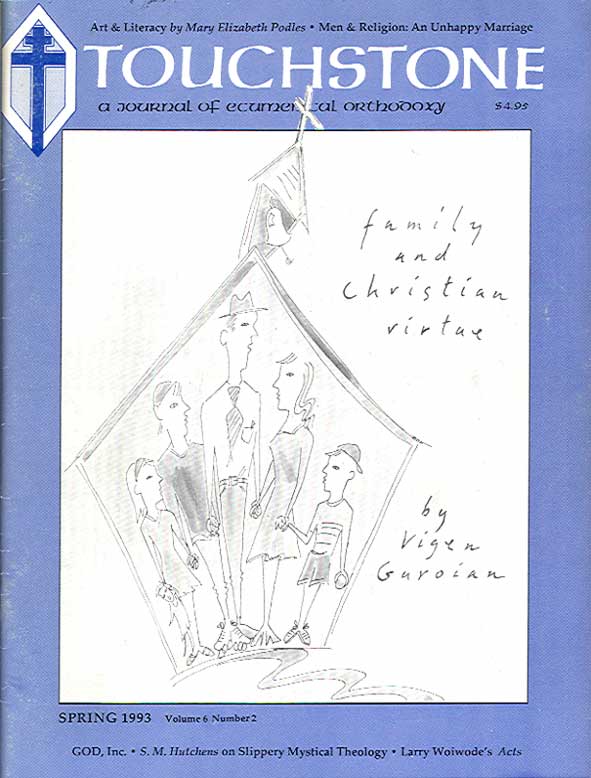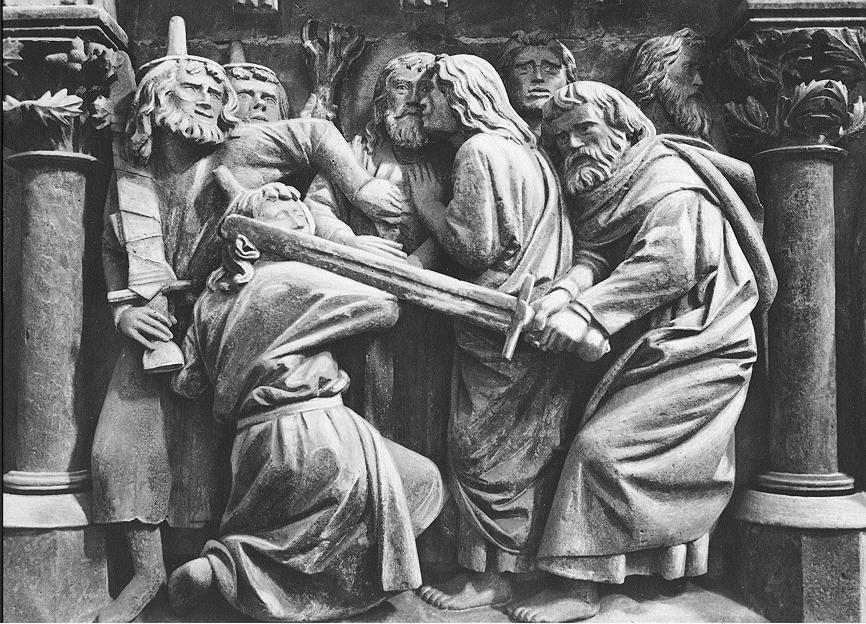On the Ordination of Women
A Correspondence Between Thomas F. Torrance and Patrick Henry Reardon
Torrance: Athanasius Approved of Women Priests?
Thank you for the new number of Touchstone, for Winter 1993 in which there are some strong reactions to my essay on the ministry of women—rather stronger and less objective than by my Orthodox friends and theologians over here—some of whom are bishops who support me.
I do not wish to reply or enter into a debate with contributors in your pages in which, among some good arguments some rather strange ideas are put forward. However, I think you should ask your contributors why they did not appeal to Didascalia Apostolorum 15, and Constitutiones Apostolicae III.6-1-2 and 9.1-4, in support of their rejection of the ministry of women? Perhaps because they are of Syrian and not mainstream provenance? They are the only patristic passages I know to which appeal might with some reason be made for the rejection of women priests.
But also ask them what they make of Athanasius the Great, Peri parthenias [De virginitate]? There he tells us that consecrated women may celebrate the Eucharist without the presence of a male priest. “The holy virgins may bless the bread three times with the signs of the Cross, give thanksgiving and pray, for in the Kingdom of Heaven there is neither male nor female. All women who were well received by the Lord attained the rank of men.”
They should also read Basil the Great, Oratio I.22ff, and Didymus the Blind, De Trinitate II.7, where it is pointed out that while in the fallen state of humanity woman was subjected to man, that has been overturned in Christ, for woman as well as man was made in the image of God and is equal in God’s sight.
I would be interested to read the theological arguments P. H. Reardon will bring forward, and see whether he confuses institutional “truth” with theological truth, or canonical decisions with dogmatic propositions. My Greek Orthodox theologian and episcopal friends all tell me that the Orthodox church has never given theological reasons for restricting the priesthood to males, but that the historical institutional acts limiting the priesthood to males have been of what they call an “economic” kind, that is, for convenient social reasons or on recommended cultural grounds. They use much the same arguments about the celibacy of bishops. I have sometimes had to warn some of my friends who become Orthodox to be aware of falling into the “convert’s disease.”
—Thomas F. Torrance
Edinburgh, Scotland
Reardon: Reply
Dr. Torrance’s reference to the De virginitate, spuriously credited to St. Athanasius, is, I regret to say, of a piece with his other desperate appeals to ancient authority. Comparison with eucharistic prayers and rituals of the period will show that the text in question has to do with the daily monastic meal, not the Divine Liturgy. If one may speak frankly, his case for women’s ordination is not well served by such bogus support from tradition. Every historical claim made by Torrance in his article was completely disproven in my response to it, a fact ill-disguised by his present reluctance “to reply or enter into a debate” on the subject.
Also, as a member of the Antiochian Orthodox archdiocese, let me say that my failure to cite standard Syrian sources certainly does not arise from some bias against them. It was not my intention to argue against the ordination of women, but only to address Torrance’s arguments from the other side.
—Patrick Henry Reardon
Torrance: Misplaced Quarrel?
The De Virginitate of St. Athanasius, far from being spurious as Patrick Henry Reardon alleges, is accepted as genuine and is included as such in the Athens Edition of the Greek Fathers published by Apostolike Diakonia tes Ekklesias tes Hellados in Athens, vol. 33, 1963. Its authenticity, backed up by Syriac and Armenian texts, was established a good while ago by Goltz, and so is not included among the Amphiballomena. Dr. Reardon’s quarrel must be taken up, therefore, not with me but with the Greek Orthodox Church which accepts it, and with established patristic scholarship. I am aware, of course, that some Western scholars in the Roman tradition would like to reject it as a genuine work of Athanasius, just as they want to reject his two books Contra Appolinarem, for their content conflicts at significant points with their own presuppositions!
—Thomas Forsyth Torrance
Edinburgh, Scotland
Reardon: Torrance Missing the Point?
Instead of frankly conceding that his appeal to the De Virginitate was no help to his case for women’s ordination, Dr. Torrance understandably prefers to change the discussion to the authorship of that book, a subject I touched only lightly in passing.
Erasmus, Scultetus, and Montfaucon being among the earlier critics, that book’s authorship has been debated intermittently for about five centuries, and it is simply pretentious to say that Torrance’s view is sustained by “established patristic scholarship.” Apparently he is persuaded simply by Goltz’s defense of the authenticity of the work and its inclusion in the uncritical Athens edition, but quite a few of us are more impressed by the contrary arguments of Batiffol, Burch, Zucchetti, Lebon, Delehaye, Leipoldt, Aubineau, Buonaiuti, Quasten and others.
Torrance’s brief remarks on the subject, moreover, do not inspire confidence. In particular, his puzzling reference to Syriac and Armenian versions of the De Virginitate leads one to think that Torrance is confusing two (of four!) different “Athanasian” treatises bearing the same name. There is, indeed, a De Virginitate preserved in Syriac fragments published by Lebon and in an Armenian version edited by Casey. The question of authorship aside, however, these versions are not the same work as that defended by Goltz and quoted by Torrance. So one is at a loss to understand his remark that the latter book is “backed up by Syriac and Armenian texts” except by presuming his confusion of the two different treatises.
But, candidly, is any of this discussion really to the point? Such concentration on a textual problem can only serve to obscure the fact that, in summoning Athanasius in support of women’s ordination, Torrance was creating evidence ex nihilo—a thing he has repeatedly shown, all through this debate, a remarkable disposition to do. Whether or not the great Alexandrian himself did write the book that Torrance cited is manifestly beside the point, inasmuch as the passage in question does absolutely nothing to further his case or to render his quoting of it anything other than an embarrassing exercise in legerdemain. I am reluctant to let that point get lost.
—Patrick Henry Reardon
This is part of a series of articles with Thomas F. Torrance and Patrick
Henry Reardon. See below:
Pt. 1 — The Ministry of Women: An Argument for the Ordination of Women by Thomas F. Torrance
Pt. 2 — Women
Priests: A Response to Thomas F. Torrance by Patrick Henry Reardon
Pt. 3 — On the Ordination of Women: A Correspondence Between Thomas F. Torrance and Patrick Henry Reardon (this article)
See also these articles by Touchstone senior editor S. M. Hutchens:
God,
Gender, and the Pastoral Office and Mystical
Theology
and the Sublimation of Gender
Thomas F. Torrance (1913-2007) at the time of writing was Professor Emeritus of Christian Dogmatics at the University of Edinburgh and former Moderator of the General Assembly of the Church of Scotland. He held doctorates in theology, science, and literature, and was associated with the Center of Theological Inquiry at Princeton.
Patrick Henry Reardon is pastor emeritus of All Saints Antiochian Orthodox Church in Chicago, Illinois, and the author of numerous books, including, most recently, Out of Step with God: Orthodox Christian Reflections on the Book of Numbers (Ancient Faith Publishing, 2019).
subscription options
Order
Print/Online Subscription

Get six issues (one year) of Touchstone PLUS full online access including pdf downloads for only $39.95. That's only $3.34 per month!
Order
Online Only
Subscription

Get a one-year full-access subscription to the Touchstone online archives for only $19.95. That's only $1.66 per month!
bulk subscriptions
Order Touchstone subscriptions in bulk and save $10 per sub! Each subscription includes 6 issues of Touchstone plus full online access to touchstonemag.com—including archives, videos, and pdf downloads of recent issues for only $29.95 each! Great for churches or study groups.
Transactions will be processed on a secure server.
more from the online archives
calling all readers
Please Donate
"There are magazines worth reading but few worth saving . . . Touchstone is just such a magazine."
—Alice von Hildebrand
"Here we do not concede one square millimeter of territory to falsehood, folly, contemporary sentimentality, or fashion. We speak the truth, and let God be our judge. . . . Touchstone is the one committedly Christian conservative journal."
—Anthony Esolen, Touchstone senior editor









